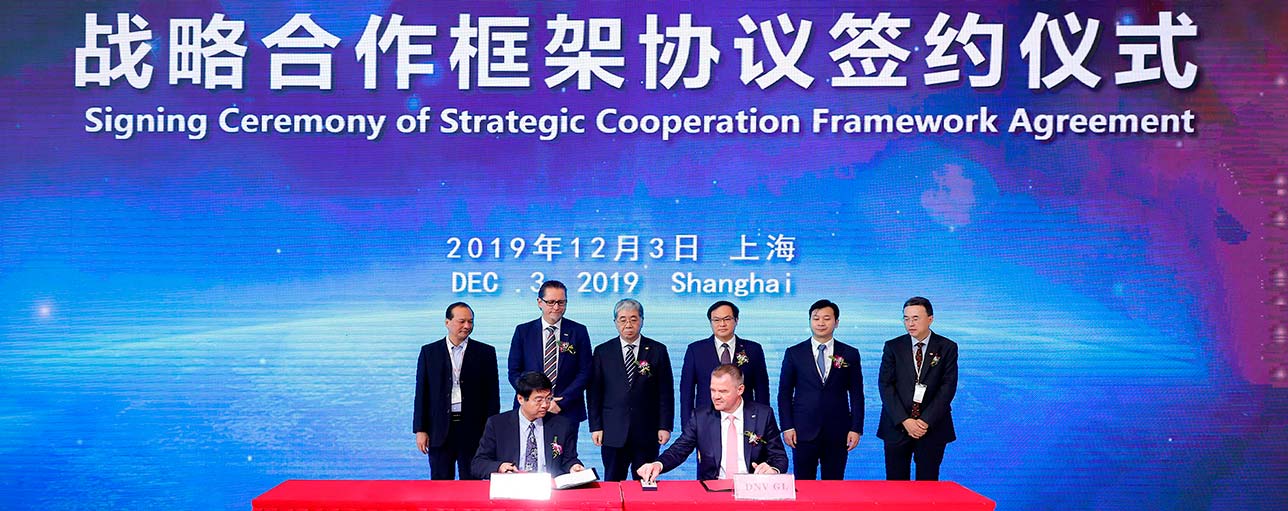CSSC, the largest shipbuilding group in the world, has entered into a new strategic partnership with DNV GL. A framework agreement between both parties was signed during Marintec China trade fair last week by Mr. Qian Jianping, Vice President of CSSC, and Norbert Kray, Regional Manager for Greater China at DNV GL – Maritime. The ceremony was witnessed by Remi Eriksen, Group President & CEO of DNV GL, CSSC Chairman Mr. Lei Fanpei, and CSSC Group President Mr. Yang Jincheng.

The strategic partnership will focus on developing future-proof solutions and competencies for shipping in a variety of fields including alternative fuels and environmentally friendly technologies, new vessel designs to meet the IMO greenhouse gas targets, digitalization and cyber security. Other areas of research and exchange are the design and building of large offshore floating structures, deep sea mining and agriculture, and ocean research activities. Under the agreement, DNV GL will support CSSC in their project engineering, construction and installation process by offering classification, certification, verification, consultancy, software and joint development services to the shipbuilding group.
“This agreement further strengthens the excellent relationship between CSSC and DNV GL,” said Remi Eriksen, Group President & CEO of DNV GL. “We have worked together on a number of state-of-the-art projects already this year, and with the merger of CSSC and CSIC I am confident the strategic agreement now signed will create even more joint opportunities in our targeted markets.”
“CSSC and DNV GL have been long-standing friends. The new strategic agreement will further strengthen our cooperation and expand its scope. When the largest shipbuilding group in the world and the leading classification society are joining forces to promote smart manufacturing, new ship research and development, and clean energy utilization, then this is of benefit for the whole maritime industry,” said CSSC Chairman Mr. Lei Fanpei.
During the trade fair, DNV GL and CSSC group shipyards had already announced several joint projects, including an Approval in Principal (AIP) to Hudong-Zhonghua shipyard for the design of a gas-fuelled 25,000 TEU container vessel, which would be the largest ship of its type to date, and a JDP with Huangpu-Wenchong Shipbuilding Company for a new energy-efficient 5,000 TEU Panamax container ship for the fast-growing intra-Asia trades.
AIPs were also presented to CSSC’s ship design consultancy SDARI for the design of a 93,000/135,000 cbm very large ethane carrier (VLEC), as well as to Dalian Shipbuilding Industry Co. for a concept design of a box-type self-elevating offshore fish farming unit.
In addition, DNV GL’s artificial intelligence (AI) research center signed a joint development project (JDP) with Guangzhou Shipyard International Company Limited (GSI). The project looks to improve welding non-destructive testing (NDT) efficiency through the use of AI technology for the automatic detection and assessment of radiography testing (RT) digital images.
DNV GL has a long history of working closely with CSSC and other Chinese customers to support them in managing the changes brought about through the tectonic shifts in markets, environmental regulations and technology. DNV GL has had a presence in China for 131 years with currently more than 350 experts across the region, a specialized approval hub, and a new research centre focused on artificial intelligence, based in Shanghai.
Source: DNV GL